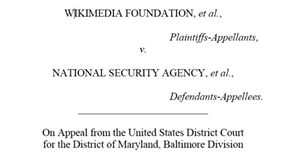AAN Joins Media Coalition Challenge to the Constitutionality of 'Upstream' Surveillance
march 3, 2016 01:00 pm

“You cited Wikipedia as your source?” = an oft-heard put down or joke. “You supported Wikimedia in Court” = not a joke at all. In fact, a deadly serious position we recently took when joining an amicus brief filed with the United States Court of Appeals for the Fourth Circuit in the case of
Wikimedia Foundation, et. al v. National Security Agency, et. al.
This case involves a challenge to the NSA's "upstream surveillance" program. Section 702 of the FISA Amendments Act of 2008 permits the government to intercept the content of communications when those communications are: (1) between
non-U.S. persons located abroad or (2) involving foreign intelligence information "related to" foreign affairs.
The "Upstream" surveillance is the program accomplishes this by tapping directly into communications infrastructure (the internet "backbone") to acquire information to, from, or "about" targets. As a result, upstream collection can sweep up internet communications that merely mention targeted selectors, even if they are not “non-US persons located abroad” or clearly have foreign intelligence information relating to foreign affairs.
The government’s Privacy and Civil Liberties Oversight Board (PCLOB) recognized “serious and novel questions” raised by collection of information in this manner. Several plaintiffs, including the Wikimedia Foundation, the PEN American Center and
The Nation, among others, claim that upstream surveillance violates their First and Fourth Amendment rights. A United States District Court dismissed the case on standing grounds – saying that none of these parties can show they have been injured by the upstream surveillance program. The case is now before the United States Court of Appeals for the Fourth Circuit.
Our brief was drafted by the Reporters Committee for Freedom of the Press. AAN was one of 17 other organizations and companies who joined the brief, which argued:
- The District Court erred in saying that the plaintiffs lacked standing in this case because of Supreme Court’s 2013 decision in Clapper v. Amnesty International. In that case, also challenging aspects of Section 702, the Supreme Court said Amnesty International could not claim standing simply because they had been forced to take “costly and burdensome measures to protect the confidentiality of international communications” in response to “highly speculative” fears. Since Clapper was decided, significant new information has come to light regarding the government’s surveillance activities, which makes the fears of illegal surveillance less “speculative.” In fact, the plaintiffs here, armed with this new knowledge, aren’t just alleging speculative harms – they can point to well-documented ongoing and publicly acknowledged issues.
- These ongoing and publicly acknowledged issues have a particular impact on journalists, stating “a reporter’s reputation for protecting her confidential sources is one bargaining chip that she can use to get useful information the public deserve to know.” Section 702 makes it less likely that sources will contact reporters with information. There are several well-documented instances of how the upstream surveillance program has this chilling effect. The brief cites studies by the Pew Research Center, the PEN American Center and Human Rights Watch to support this claim. It also outlines the changes in detail, showing how they are difficult and expensive to implement and a true hindrance on newsgathering.
- Finally, there is particular tension arising from the interaction between Fourth Amendment protections and First Amendment rights where surveillance of journalists occurs. Though it ultimately ruled against the press in that case, the Supreme Court held in Zurcher v. Stanford Daily that “where materials to be searched or seized ‘may be protected by the First Amendment, the requirements of the Fourth Amendment must be applied with “scrupulous exactitude.”’” In other words, the warrant requirement – and any exceptions to that requirement – must especially be adhered to where the press is the entity being subjected to the search. The response to Zurcher, however, is more instructive. That was the Privacy Protection Act, a law passed in 1980 to protect newsrooms from unreasonable search and seizure. As the brief notes, Section 702 appears to conflict with the Privacy Protection Act. Therefore, journalists should be treated differently under Section 702 – or, at the very least, should have the ability to make that argument in court.
Ultimately, this case is important not only because of the general surveillance issues but also because of the effect on reporters. The specific issue we’re arguing here has broad impact beyond this case: at what point can a journalist show he or she is affected by a broad surveillance program (or even a general law)? We obviously want the ability of journalists to challenge laws in court to be as broad as possible.

